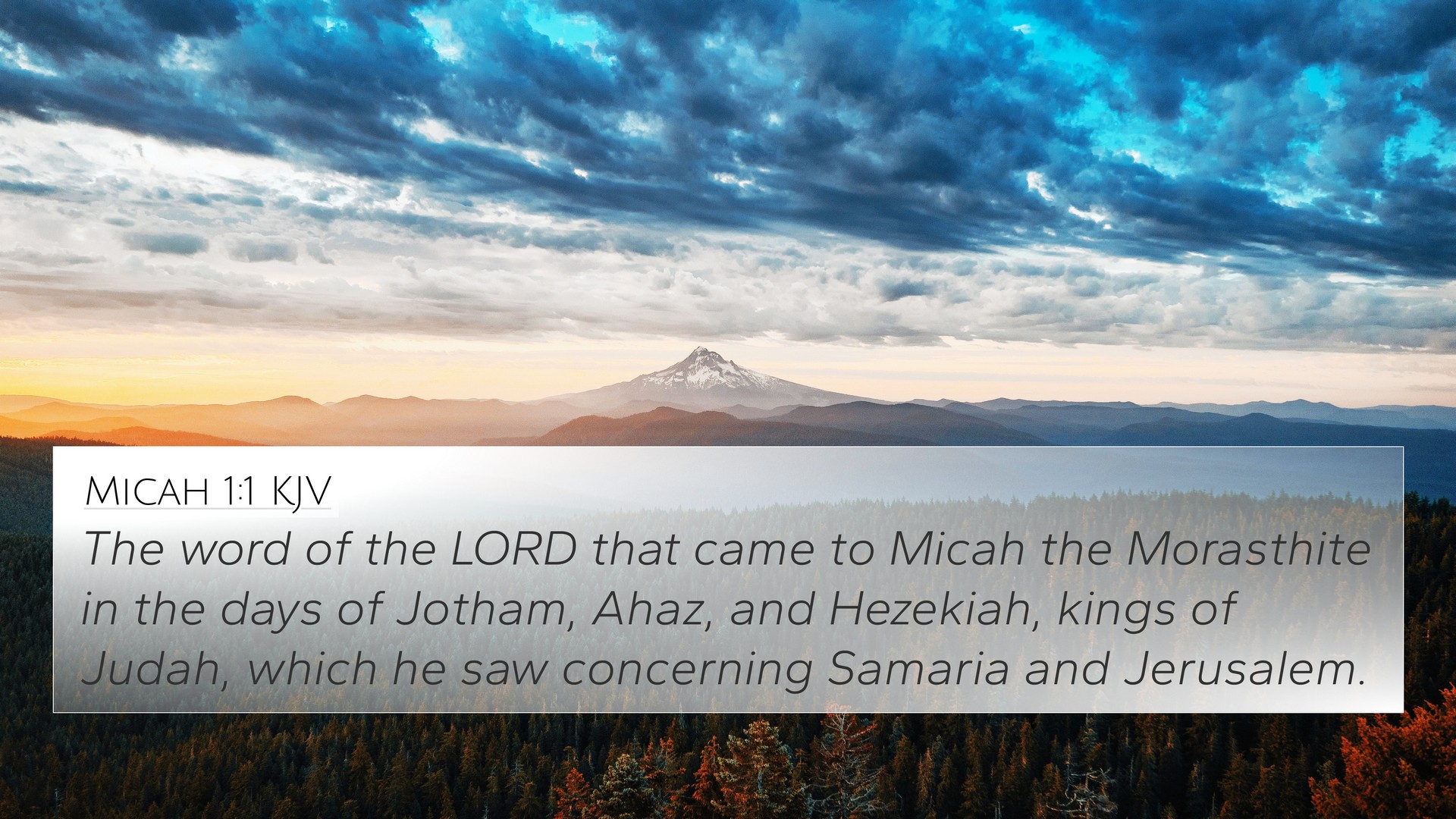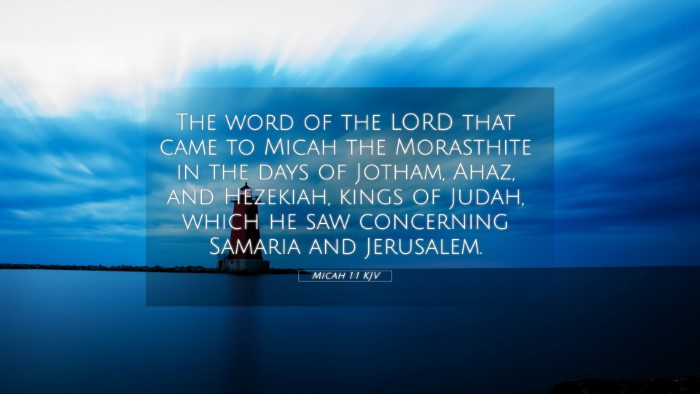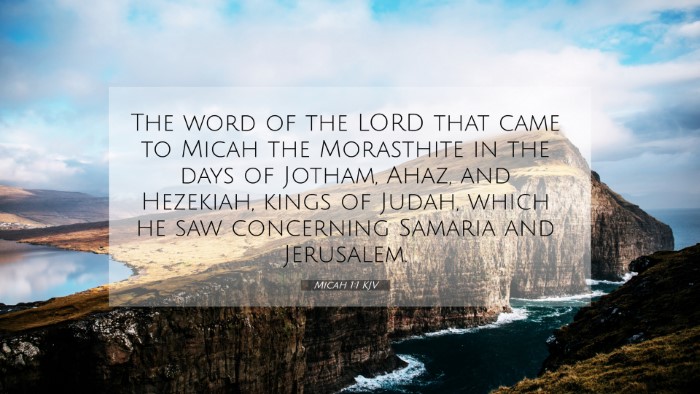Old Testament
Genesis Exodus Leviticus Numbers Deuteronomy Joshua Judges Ruth 1 Samuel 2 Samuel 1 Kings 2 Kings 1 Chronicles 2 Chronicles Ezra Nehemiah Esther Job Psalms Proverbs Ecclesiastes Song of Solomon Isaiah Jeremiah Lamentations Ezekiel Daniel Hosea Joel Amos Obadiah Jonah Micah Nahum Habakkuk Zephaniah Haggai Zechariah MalachiMicah 1:1 Similar Verses
Micah 1:1 Cross References
The word of the LORD that came to Micah the Morasthite in the days of Jotham, Ahaz, and Hezekiah, kings of Judah, which he saw concerning Samaria and Jerusalem.
Uncover the Rich Themes and Topics of This Bible Verse
Listed below are the Bible themes associated with Micah 1:1. We invite you to explore each theme to gain deeper insights into the Scriptures.
Micah 1:1 Cross Reference Verses
This section features a detailed cross-reference designed to enrich your understanding of the Scriptures. Below, you will find carefully selected verses that echo the themes and teachings related to Micah 1:1 KJV. Click on any image to explore detailed analyses of related Bible verses and uncover deeper theological insights.
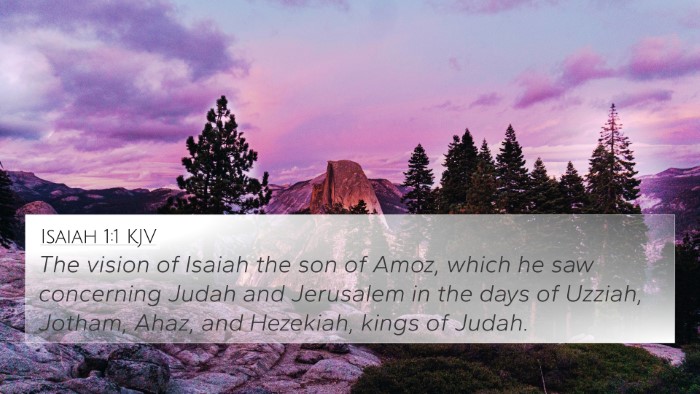
Isaiah 1:1 (KJV) »
The vision of Isaiah the son of Amoz, which he saw concerning Judah and Jerusalem in the days of Uzziah, Jotham, Ahaz, and Hezekiah, kings of Judah.
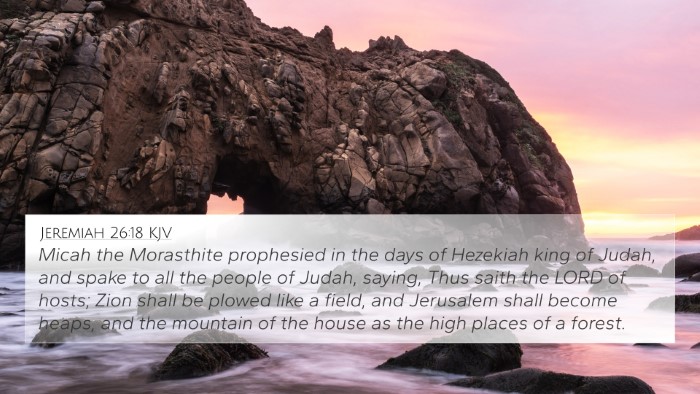
Jeremiah 26:18 (KJV) »
Micah the Morasthite prophesied in the days of Hezekiah king of Judah, and spake to all the people of Judah, saying, Thus saith the LORD of hosts; Zion shall be plowed like a field, and Jerusalem shall become heaps, and the mountain of the house as the high places of a forest.
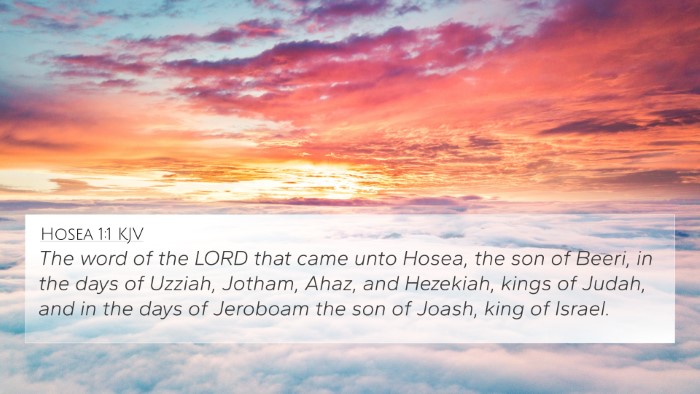
Hosea 1:1 (KJV) »
The word of the LORD that came unto Hosea, the son of Beeri, in the days of Uzziah, Jotham, Ahaz, and Hezekiah, kings of Judah, and in the days of Jeroboam the son of Joash, king of Israel.
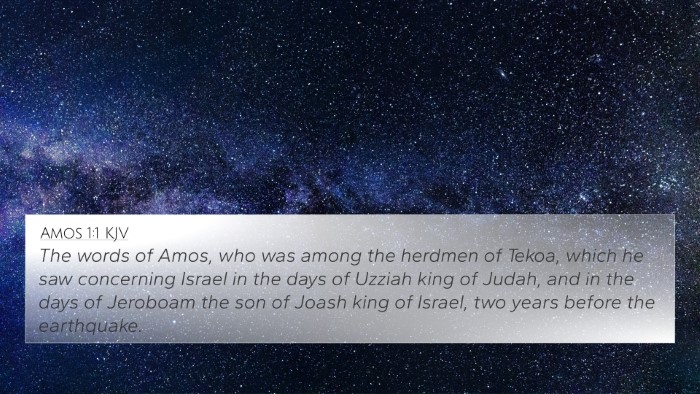
Amos 1:1 (KJV) »
The words of Amos, who was among the herdmen of Tekoa, which he saw concerning Israel in the days of Uzziah king of Judah, and in the days of Jeroboam the son of Joash king of Israel, two years before the earthquake.
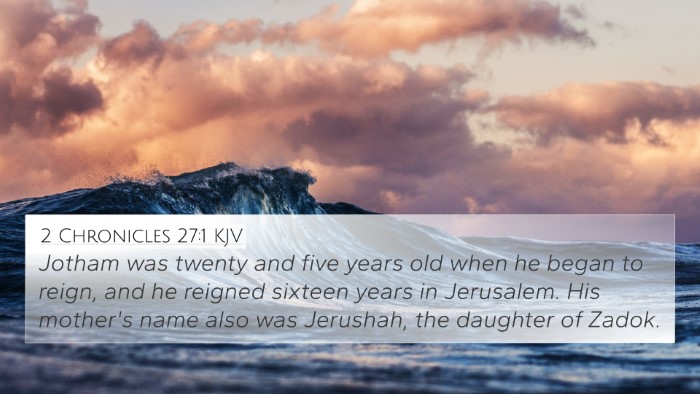
2 Chronicles 27:1 (KJV) »
Jotham was twenty and five years old when he began to reign, and he reigned sixteen years in Jerusalem. His mother's name also was Jerushah, the daughter of Zadok.
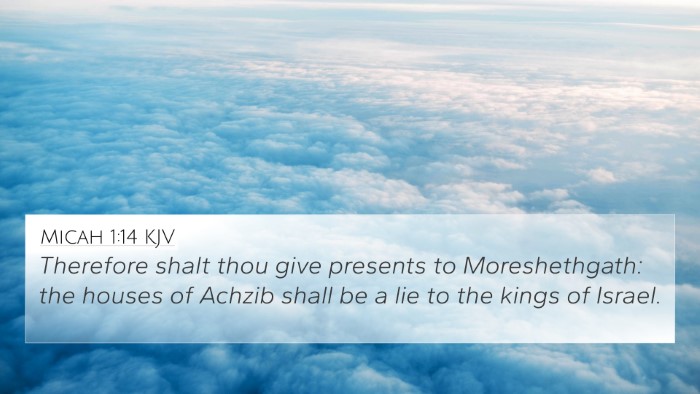
Micah 1:14 (KJV) »
Therefore shalt thou give presents to Moreshethgath: the houses of Achzib shall be a lie to the kings of Israel.
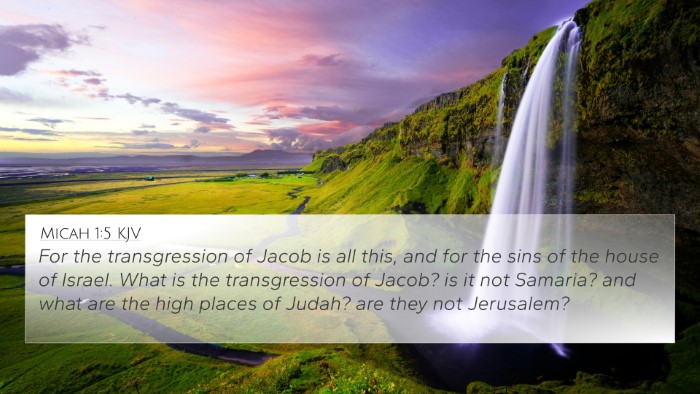
Micah 1:5 (KJV) »
For the transgression of Jacob is all this, and for the sins of the house of Israel. What is the transgression of Jacob? is it not Samaria? and what are the high places of Judah? are they not Jerusalem?
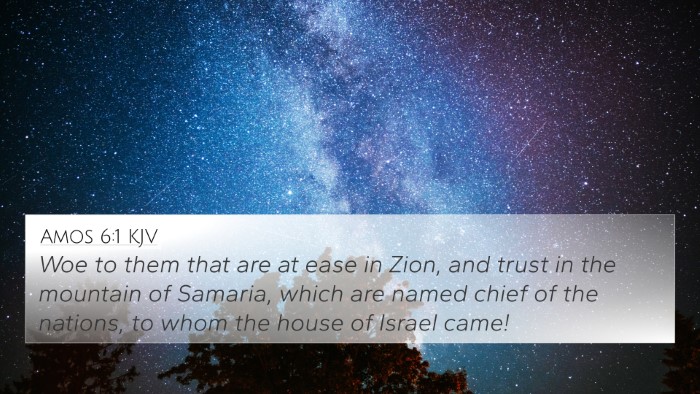
Amos 6:1 (KJV) »
Woe to them that are at ease in Zion, and trust in the mountain of Samaria, which are named chief of the nations, to whom the house of Israel came!
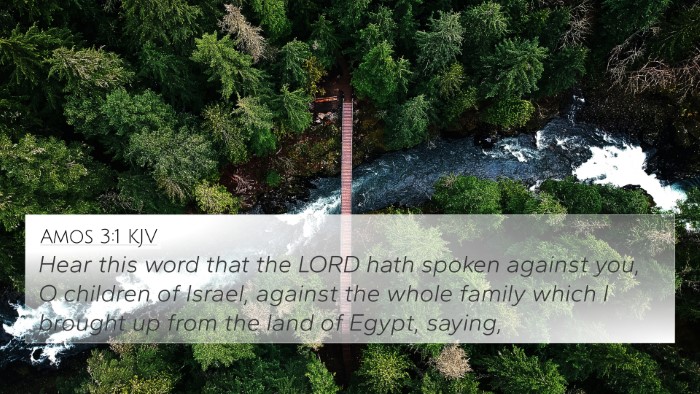
Amos 3:1 (KJV) »
Hear this word that the LORD hath spoken against you, O children of Israel, against the whole family which I brought up from the land of Egypt, saying,
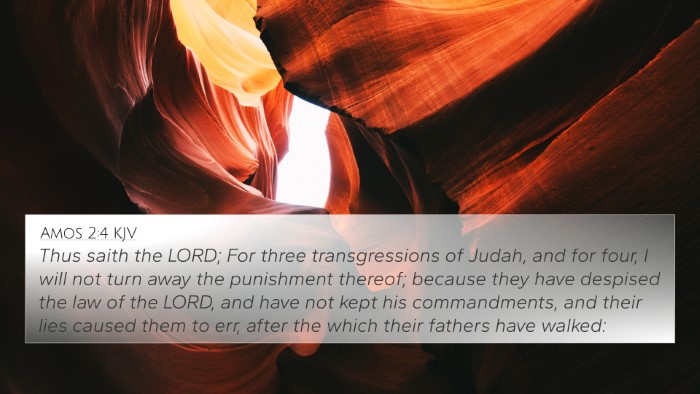
Amos 2:4 (KJV) »
Thus saith the LORD; For three transgressions of Judah, and for four, I will not turn away the punishment thereof; because they have despised the law of the LORD, and have not kept his commandments, and their lies caused them to err, after the which their fathers have walked:
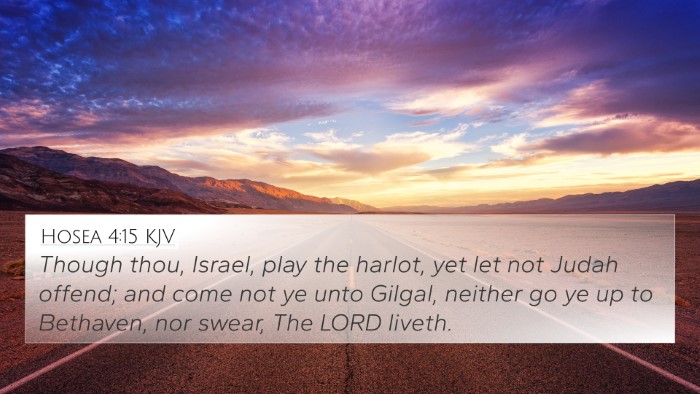
Hosea 4:15 (KJV) »
Though thou, Israel, play the harlot, yet let not Judah offend; and come not ye unto Gilgal, neither go ye up to Bethaven, nor swear, The LORD liveth.
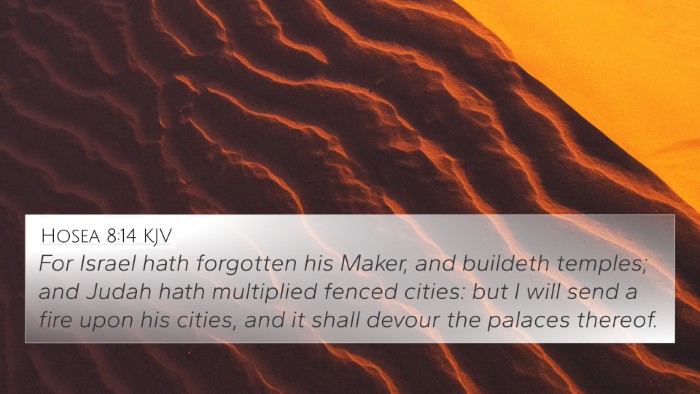
Hosea 8:14 (KJV) »
For Israel hath forgotten his Maker, and buildeth temples; and Judah hath multiplied fenced cities: but I will send a fire upon his cities, and it shall devour the palaces thereof.

Hosea 12:1 (KJV) »
Ephraim feedeth on wind, and followeth after the east wind: he daily increaseth lies and desolation; and they do make a covenant with the Assyrians, and oil is carried into Egypt.

Hosea 5:5 (KJV) »
And the pride of Israel doth testify to his face: therefore shall Israel and Ephraim fall in their iniquity: Judah also shall fall with them.
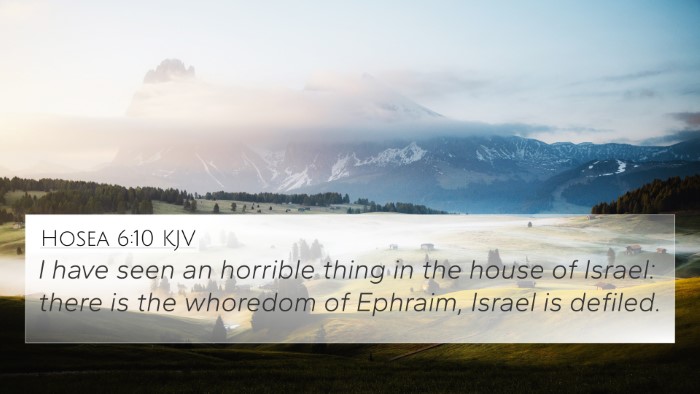
Hosea 6:10 (KJV) »
I have seen an horrible thing in the house of Israel: there is the whoredom of Ephraim, Israel is defiled.
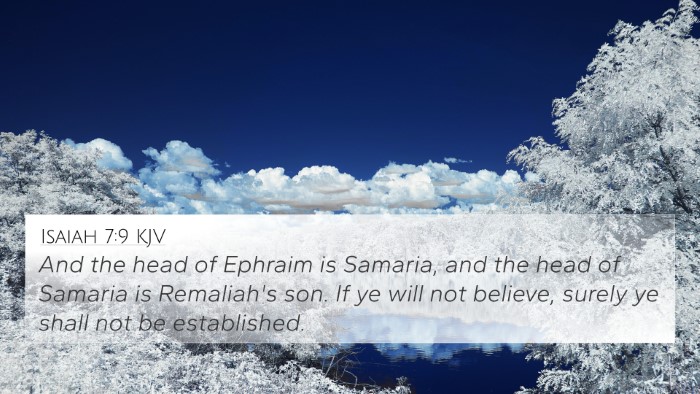
Isaiah 7:9 (KJV) »
And the head of Ephraim is Samaria, and the head of Samaria is Remaliah's son. If ye will not believe, surely ye shall not be established.
Micah 1:1 Verse Analysis and Similar Verses
Meaning and Interpretation of Micah 1:1
Micah 1:1 states, "The word of the LORD that came to Micah the Morashtite in the days of Jotham, Ahaz, and Hezekiah, kings of Judah, which he saw concerning Samaria and Jerusalem." This verse sets the stage for understanding the prophetic message delivered by Micah during a tumultuous time in Israel's history. Below is a detailed analysis combining insights from various public domain commentaries.
Contextual Background
Micah was a prophet from Moresheth, a town in southern Judah. He prophesied during the reigns of several kings, namely Jotham, Ahaz, and Hezekiah, which places his ministry in the late 8th century BC. This was a period characterized by moral decay, social injustice, and impending judgment from God on both Israel (the Northern Kingdom) and Judah (the Southern Kingdom).
- Matthew Henry's Commentary: Highlights the importance of the prophetic call and the judgment impending upon both kingdoms, emphasizing God's sovereignty and the accountability of His people.
- Albert Barnes: Points out the significance of the names and the geography involved, linking Micah's message to the cities that will face divine judgment.
- Adam Clarke: Focuses on Micah's vision and its urgency, suggesting the need for the people to heed his warnings.
Biblical Significance
This verse is more than just an introduction; it carries profound theological implications about God's communication with His people through prophets. The phrase "the word of the LORD" indicates divine authority and the seriousness of Micah's message.
- Divine Revelation: It indicates that Micah's message is inspired and not merely his own thoughts.
- Judgment Foreseen: The towns of Samaria and Jerusalem serve as focal points for the approaching judgment, reflecting God's concern for both Israel and Judah.
- Role of Prophets: Micah exemplifies the role of prophets in warning God's people and calling them to repentance.
Cross-Referencing Biblical Texts
Several Bible verses provide thematic connections to Micah 1:1:
- Isaiah 1:1: Similar prophetic introduction highlighting the message to Judah.
- Jeremiah 1:1-2: Establishes the role of the prophet in relaying God's word.
- Hosea 1:1: Another prophet called during a similar historical period.
- Amos 1:1: Connects Micah’s message of judgment with that of another contemporary prophet.
- 2 Kings 18:1-12: Discusses the reign of King Hezekiah and the spiritual context during Micah's time.
- 2 Chronicles 28:1-3: Details King Ahaz's reign and its idolatrous practices.
- Micah 3:12: Provides clarity on the specific judgments forecasted by Micah regarding Jerusalem.
Thematic Connections
Micah's prophecy connects deeply with themes of justice, mercy, and the call to repentance:
- Justice and Righteousness: Micah later emphasizes God's requirement of justice (Micah 6:8), relevant to the societal issues mentioned in the verse.
- God’s Sovereignty: The reference to God's word shows His ultimate control over history and nations.
- The Redeemer: The prophetic nature indicates the hope of future redemption amidst judgment.
Practical Application
For modern readers, Micah 1:1 serves as a reminder of the continual need for vigilance in faith and practice. It calls for an awareness of God’s messages in both times of plenty and times of hardship.
- Listening to God: Encourages individuals to actively listen for God's guidance through His word.
- Heeding Warnings: Reminds readers of the importance of responding to divine warnings and calls to repentance.
- Understanding Consequences: Suggests the need to understand the consequences of collective sin as a nation or community.
Conclusion
In summary, Micah 1:1 not only introduces the prophet Micah but also encapsulates the core message of prophetic literature—the urgency of calling God's people back to righteousness amidst the reality of judgment. This verse, rich with themes of justice and divine communication, calls for introspection and action in the hearts of its listeners, both ancient and modern.
Additionally, through cross-referencing with related scriptures, readers can gain deeper insights into the interconnectedness within the biblical narrative, enhancing their understanding of the messages woven throughout the scriptures.
